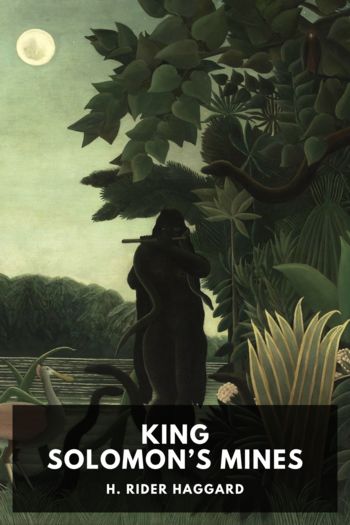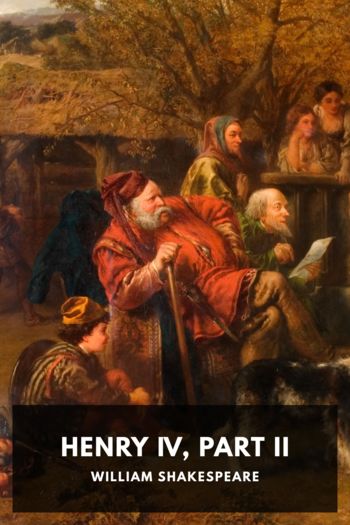King Solomon’s Mines - H. Rider Haggard (best life changing books .TXT) 📗

- Author: H. Rider Haggard
Book online «King Solomon’s Mines - H. Rider Haggard (best life changing books .TXT) 📗». Author H. Rider Haggard
“They make a good pair, don’t they?” said Good; “one as big as the other.”
“I like your looks, Mr. Umbopa, and I will take you as my servant,” said Sir Henry in English.
Umbopa evidently understood him, for he answered in Zulu, “It is well”; and then added, with a glance at the white man’s great stature and breadth, “We are men, you and I.”
IV An Elephant HuntNow I do not propose to narrate at full length all the incidents of our long travel up to Sitanda’s Kraal, near the junction of the Lukanga and Kalukwe Rivers. It was a journey of more than a thousand miles from Durban, the last three hundred or so of which we had to make on foot, owing to the frequent presence of the dreadful tsetse fly, whose bite is fatal to all animals except donkeys and men.
We left Durban at the end of January, and it was in the second week of May that we camped near Sitanda’s Kraal. Our adventures on the way were many and various, but as they are of the sort which befall every African hunter—with one exception to be presently detailed—I shall not set them down here, lest I should render this history too wearisome.
At Inyati, the outlying trading station in the Matabele country, of which Lobengula (a great and cruel scoundrel) is king, with many regrets we parted from our comfortable wagon. Only twelve oxen remained to us out of the beautiful span of twenty which I had bought at Durban. One we lost from the bite of a cobra, three had perished from “poverty” and the want of water, one strayed, and the other three died from eating the poisonous herb called “tulip.” Five more sickened from this cause, but we managed to cure them with doses of an infusion made by boiling down the tulip leaves. If administered in time this is a very effective antidote.
The wagon and the oxen we left in the immediate charge of Goza and Tom, our driver and leader, both trustworthy boys, requesting a worthy Scotch missionary who lived in this distant place to keep an eye on them. Then, accompanied by Umbopa, Khiva, Ventvögel, and half a dozen bearers whom we hired on the spot, we started off on foot upon our wild quest. I remember we were all a little silent on the occasion of this departure, and I think that each of us was wondering if we should ever see our wagon again; for my part I never expected to do so. For a while we tramped on in silence, till Umbopa, who was marching in front, broke into a Zulu chant about how some brave men, tired of life and the tameness of things, started off into a vast wilderness to find new things or die, and how, lo and behold! when they had travelled far into the wilderness they found that it was not a wilderness at all, but a beautiful place full of young wives and fat cattle, of game to hunt and enemies to kill.
Then we all laughed and took it for a good omen. Umbopa was a cheerful savage, in a dignified sort of way, when he was not suffering from one of his fits of brooding, and he had a wonderful knack of keeping up our spirits. We all grew very fond of him.
And now for the one adventure to which I am going to treat myself, for I do dearly love a hunting yarn.
About a fortnight’s march from Inyati we came across a peculiarly beautiful bit of well-watered woodland country. The kloofs in the hills were covered with dense bush, idoro bush as the natives call it, and in some places, with the wacht-een-beche, or “wait-a-little thorn,” and there were great quantities of the lovely machabell tree, laden with refreshing yellow fruit having enormous stones. This tree is the elephant’s favourite food, and there were not wanting signs that the great brutes had been about, for not only was their spoor frequent, but in many places the trees were broken down and even uprooted. The elephant is a destructive feeder.
One evening, after a long day’s march, we came to a spot of great loveliness. At the foot of a bush-clad hill lay a dry riverbed, in which, however, were to be footund pools of crystal water all trodden round with the hoof-prints of game. Facing this hill was a park-like plain, where grew clumps of flat-topped mimosa, varied with occasional glossy-leaved machabells, and all round stretched the sea of pathless, silent bush.
As we emerged into this riverbed path suddenly we started a troop of tall giraffes, who galloped, or rather sailed off, in their strange gait, their tails screwed up over their backs, and their hoofs rattling like castanets. They were about three hundred yards from us, and therefore practically out of shot, but Good, who was walking ahead, and who had an express loaded with solid ball in his hand, could not resist temptation. Lifting his gun, he let drive at the last, a young cow. By some extraordinary chance the ball struck it full on the back of the neck, shattering the spinal column, and that giraffe went rolling head over heels just like a rabbit. I never saw a more curious thing.
“Curse it!” said Good—for I am sorry to say he had a habit of using strong language when excited—contracted, no doubt, in the course of his nautical career; “curse it! I’ve killed him.”
“Ou, Bougwan,” ejaculated the Kafirs; “ou! ou!”
They called Good Bougwan, or Glass Eye, because of his eyeglass.
“Oh, Bougwan!” reechoed Sir Henry and





Comments (0)